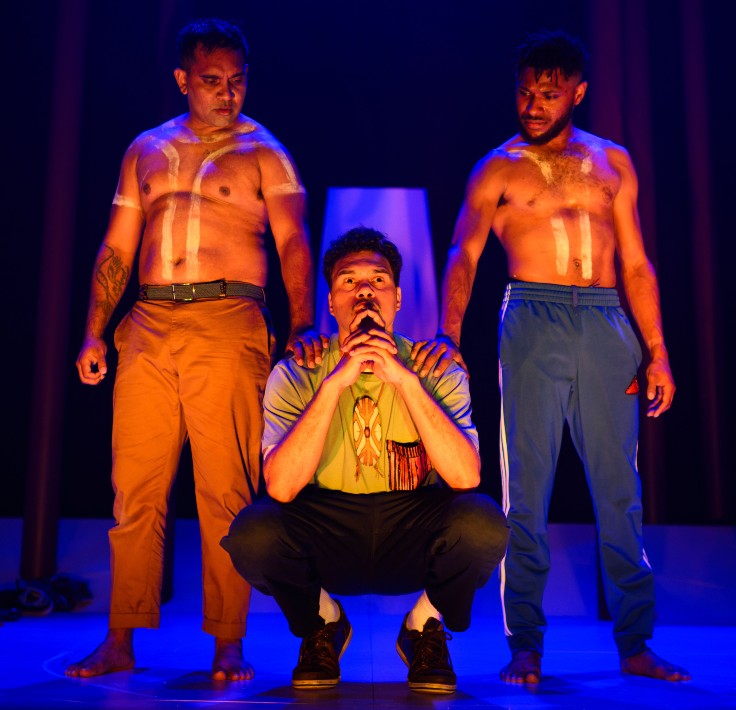Arts Review
Dear Brother

Dear Brother
Bille Brown Theatre
September 12th, 2024
“This work moves like a big song. Not so much in that it’s sung but in how it flows from one verse or scene to the next. Its rhythm is constant and the connection between all who sing it is palpable.” This quote, from director Isaac Drandic, is a perfect summation of what audiences can expect from Dear Brother, a new play written by Lenny Donahue and Tibian Wyles, showing at Queensland Theatre from September 7th to 28th.
Dear Brother is a complex and moving performance that fuses First Nations’ language, song and dance with contemporary and experimental elements, resulting in a work without parallel. Jointly produced by Queensland Theatre and BlakDance, for Brisbane Festival 2024, Dear Brother wrestles with the difficult themes of masculinity, family, culture and acceptance through a uniquely Aboriginal lens. At times heartbreaking and humorous, there is vulnerability to the performances that is intensely relatable for anyone who has experienced the upheavals of moving from adolescence to adulthood.
Centered around three characters, Ezra (Lenny Donahue), Destyn (Tibian Wyles) and Jazz (Benjin Maza) whose lives converge at university in Brisbane. Ezra and Jazz both moved from North Queensland whilst Destyn was Brisbane-born but —at his insistence— raised in New South Wales. Each is shackled with their own personal burdens: Ezra is seeking to be present for his young son, who moved south with his mother, Jazz is a talented basketball player whose real passion is music and Destyn is seeking to reestablish contact with an older brother he lost touch with years ago. Kelton Pell completes the cast, acting at times as storyteller and director, with a pivotal collection of performances as four separate Elders who play significant roles in each of the young men’s lives.
Often abandoning traditional structures in favour of a more innovative approach, Dear Brother twists and flows like a river at its own pace and with its own intent. Opening with a particularly beautiful scene that fuses music, dance and story-telling, the play begins in darkness before a creator figure appears and gives life to the three young men at the heart of the story. Special mention needs to be given to choreographer Waangenga Blanco and composer Brendon Boney whose masterful contributions to the production imbue the proceedings with a powerful sense of history and modernity, linking ancient Aboriginal practice with modern techniques.
Dear Brother’s greatest strength hinges on its unorthodoxy, whether by its inventive narrative structure or via its insistence on examining the concept of Aboriginal masculinity through a non-traditional lens. Fearless in its sensitivity, it portrays an Aboriginal existence that is notably absent in modern media while still addressing the trauma and discrimination that —sadly— is still so central to the lives of many First Nations people.
Told as a series of short vignettes, these snapshots form brief moments in each of the central character’s lives and are realised through a combination of story-telling, song, dance and dialogue. The actors shift seamlessly —and masterfully— between traditional and modern dance forms whilst speaking in a combination of language and English. Often humorous, despite the heavy nature of the subject matter, the writer’s ability to generate laughter despite of misfortune does much to endear the characters to the audience.
Despite being so heavily rooted in First Nations culture, Dear Brother’s heart makes it accessible to audiences who do not share the character’s cultural background. At its core, it is a story of transition, from the awkward certainty of adolescence to the difficult unpredictability of adulthood. Destyn, Ezra and Jazz navigate terrain that all of us —as humans— eventually face. Questions of identity and acceptance, coupled with the weight and responsibility of forging your own path in an ever-changing world.
Dear Brother is an exceptional piece of powerful but vulnerable storytelling, while its embrace of the avant-garde makes it visually and sonically stunning. Donahue and Wyles have managed to create something unique and wonderful, a celebration of culture and a touching tale of friendship that feels as timeless as it does fresh.
Nick Stephan